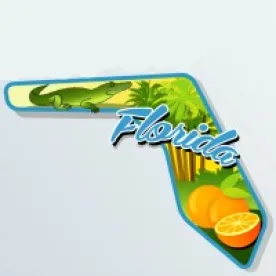On May 21, 2015, Florida Governor Rick Scott signed the True Origin of Digital Goods Act with bipartisan support in both the United States House of Representatives (House) and Senate.
Summary and Impact on Businesses
The law requires companies with websites and other online services (e.g., mobile apps) that distribute music, video, and other audiovisual content (not including video games) of third parties to include the website owner’s contact information — full and correct name, physical address, and either telephone number or email address prominently on the website.
The law applies to websites that distribute audiovisual content “to consumers in this state,” and is not limited on its face to companies headquartered or with physical locations in Florida. As such, the law can have applicability to companies headquartered or located outside of Florida, depending on its connections and business with consumers residing in the state of Florida.
Companies that distribute third party music, videos, and other audiovisual materials should take action now to comply with the law, which becomes effective July 1, 2015. The company’s website should display the full, true, and correct name of the website owner (e.g., the full official name of the corporation), its physical address, and either its telephone number or e-mail address. This information should be displayed prominently (e.g., clearly noticeable on the home page, under “Contact Us,” “About Us,” etc., and not buried in the website Terms of Use or other detailed and lengthy terms and conditions.
More Information About the Law
In particular, the law requires that:
A person who owns or operates a website or online service dealing in substantial part in the electronic dissemination of commercial recordings or audiovisual works, directly or indirectly, and who electronically disseminates such works to consumers in this state shall clearly and conspicuously disclose his or her true and correct name, physical address, and telephone number or e-mail address on his or her website or online service in a location readily accessible to a consumer using or visiting the website or online service.
The law applies to websites and other online services that distribute substantial portions of “commercial recording or audiovisual works,” defined as:
A recording or audiovisual work whose owner, assignee, authorized agent, or licensee has disseminated or intends to disseminate such recording or audiovisual work for sale, for rental, or for performance or exhibition to the public, including under license, but does not include an excerpt consisting of less than substantially all of a recording or audiovisual work. A recording or audiovisual work may be commercial regardless of whether a person who electronically disseminates it seeks commercial advantage or private financial gain from the dissemination. The term does not include video games, depictions of video game play, or the streaming of video game activity.
The contact information must be provided in one or more of the following locations:
- A landing or home web page or screen
- An “about” or “about us” web page or screen
- A “contact” or “contact us” web page screen
- An information web page or screen
- Another place on the website or online service commonly used to display identifying information to consumers
Copyright owners have the right to seek injunctive relief in a declaratory judgment in the event a website owner violates the law. While the law does not specifically permit recovery of damages, it does not limit the copyright owner’s ability to sue the website owner for damages under applicable copyright law and other laws. Prior to filing a lawsuit the copyright owner must make reasonable efforts to place the website owner on notice that the owner and site may be in violation of law, and that failure to cure within 14 days may result in a civil action being filed. The copyright owner can then seek an order compelling compliance with the law.
Presumably, if the website owner does not comply with such an order, the copyright owner could obtain an order requiring the registrar of the domain to take down the website. It remains to be seen how courts will enforce the law in the event of a recalcitrant or silent website owner. The law provides that the prevailing party in a cause under this section is entitled to recover necessary expenses and reasonable attorney fees.
The goal of the law, supported heavily by the recording industry, is to make it easier for copyright owners of digital recordings (music and videos) to enforce their rights. Individuals that pirate content and distribute unlawful copies through websites are typically hard to identify, and they even register the domain name through a service that allows them to remain anonymous, such as Domains by Proxy.
The recording industry applauded the move. The Copyright Alliance stated:
With this definition, the bill provides reasonable and meaningful support to copyright owners for enforcing their rights. By focusing only on sites that make available “substantially all of a recording or audiovisual work,” the bill does not affect users of short excerpts for criticism or review of a protected work, who can remain anonymous if they wish to.
Bad online actors tend to misuse the anonymity of the Internet as one of their lines of defense against the enforcement of copyrights. To that extent, this bill is beneficial to creators who wish to protect their works online. It is also beneficial to consumers, who will have more information about the source where they obtain music or films.
Similarly, Cary Sherman, the Chairman and CEO of the Recording Industry Association of America,stated:
This bill is a major step forward in preserving the integrity and transparency of today’s Internet environment. It helps provide consumers with important information so they can make the best decision when shopping for music online. Knowledge and information are important components of a savvy Internet user.
This law should also provide a shot in the arm to a key driver of Florida’s culture and economy — the significant Latin music presence in the state, which has suffered a dramatic decline in the past 15 years. The law will help expose the shady retailers looking to profit off the hardworking artists, musicians, songwriters, producers, engineers, and others involved in the chain of music creation. A little sunlight in the Sunshine State can go a long way, and that’s a welcome development for Florida’s music community.
Conclusion
Because the law may apply to companies headquartered or located outside the state of Florida, all businesses that distribute music, videos and other audiovisual materials should take action now to comply with the law. The company’s website should prominently display the full, true, and correct name of the website owner, its physical address, and either its telephone number or email address.





 />i
/>i

